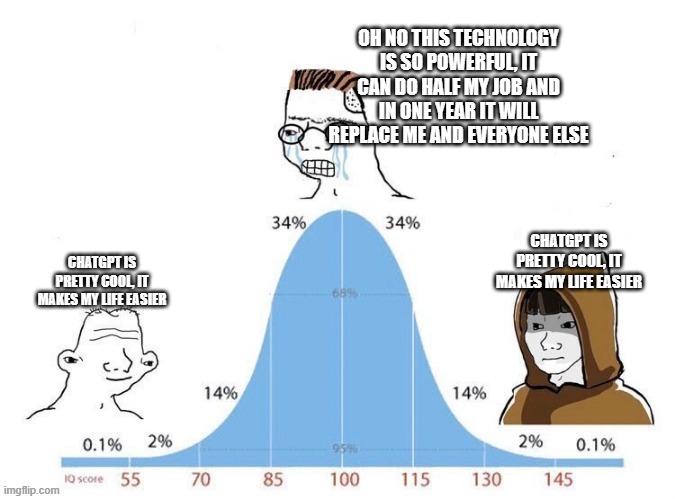Some thoughts on OpenAI.
ChatGPT
- OpenAI was surprised by its success1
- in fact, the hype train it created was so big, that it single-handedly re-ignited the hype of the whole AI industry
- They reacted well and jumped on the train
- Sam Altman took the chance and transformed OpenAI from a non-profit research lab into a full-blown product company
- The transition was turbulent, shifting identity and goals
- Ultimately, Sam Altman and his team succeeded, pushing out opposing parties
- ChatGPT is now a well-known product
- Consumers see it as a smart chatbot that boosts productivity
- However, consumers don’t understand the technology behind it
- To them, it’s a magical black box capable of creating images, writing code, answering questions, etc.
- In reality, it’s many parts working together seamlessly
- OpenAI intentionally obfuscates ChatGPT’s workings to:
- Avoid giving competitors an advantage
- Make ChatGPT seem like magic
- This fuels fears about AGI
- People worry about job security, the future, and AI dominance
- i.e. it’s the best advertising they could wish for (see AGI)
- This fuels fears about AGI
Limits
- OpenAI (and everyone else) is running out of training data for GPTs2
- Still, I don’t think that training data is the biggest problem, as there will probably be other ways of optimizing and improving models
- However, these improvements will take more time and effort than ‘just’ training a model with more data
- I also doubt one could reach any form of strong AI, which would pose the threat of Singularity using the GPT approach
- Training GPT models with human artifacts will approximate performance, not exceed it
- don’t get me wrong, the current tech is indeed a major breakthrough
- it single-handedly dropped the cost of (low-medium) intelligence
- with that drop in cost, there will be major movements in the economy (and ones every day life)
- I even built multiple projects myself using the OpenAI API myself, it’s great
- however, its progress does not scale
- they can’t just ‘train a new model longer, with more data’ to make it twice as smart forever
- that’s their problem
- Energy consumption and economic viability will also limit GPTs’ success
- Currently, VC funding covers costs
- Investors will eventually expect returns
- OpenAI’s current pricing and free offerings won’t last forever3
- When costs rise, excitement and expectations for GPTs will decrease
AGI
- OpenAI does not have a master plan
- It’s just a rapidly growing startup riding a wave of success from an experiment
- Initially, they aimed to build AGI
- This goal remains distant (see Limits)
- Instead, they are currently riding the ChatGPT hype wave
- They must maintain this momentum to avoid failure
- They do this by:
- Indirectly fearmongering about AGI
- Obfuscating product workings to make them seem magical
- Trying to monopolize popular AI terms to direct hype and energy towards them4
- Generating revenue through investments and building successful products atop ChatGPT
- They do this by:
- They must maintain this momentum to avoid failure
- Furthermore, the pressure created by the ChatGPT hype squashed their (public) timeline of achieving AGI
- This is evident in Sam Altman’s interviews, pre- and post-ChatGPT
- Pre-ChatGPT, interviews were informative and targeted at experts, with AGI being a distant goal
- Post-ChatGPT, interviews feel like pop-science
- The focus is on grand visions of an AGI-driven world
- These ‘interviews’ are disguised advertisements
- Targeting well-educated audiences
- Assuming AGI (created by OpenAI) as an inevitable future
- Portraying OpenAI as an open research lab on the brink of achieving AGI, inviting public participation through prototype testing
- In reality, they are a for-profit company focused on product creation and revenue
- They rely on the research lab image to function
- Therefore, concerns about AGI or ethics are often just marketing
- It’s similar to how Nike sells sportswear, making consumers feel like high-performance athletes through advertisements

Competition
- OpenAI dislikes competition
- As noted in ChatGPT, they aim to create a monopoly
- They want ‘OpenAI’ to be synonymous with ‘AI’
- They hinder smaller competitors by calling for AI regulations5
- To make regulators move faster, they pull out their good old ‘AGI is coming’ trump card
- These regulations would hurt OpenAI but devastate smaller competitors
Drama
- OpenAI’s transformation has generated much noise
- This drama feels like a reality show for Zoomers
- It attracts media attention, creates discussions, and emotions
- This isn’t necessarily bad for OpenAI, as they benefit from the attention (and attention is all you need after all ;) )
- Important information remains inside the company through lifetime NDAs6
Links
Other
- OpenAI researchers warned board of AI breakthrough ahead of CEO ouster | Hacker News (ycombinator.com)
- After OpenAI’s blowup, it seems pretty clear that ‘AI safety’ isn’t a real thing | Hacker News (ycombinator.com)
- OpenAI’s Long-Term AI Risk Team Has Disbanded | WIRED
Footnotes
-
OpenAI Cofounder Surprised by ChatGPT’s Massive Success (businessinsider.com) ↩
-
OpenAI is too cheap to beat | Hacker News (ycombinator.com) ↩
-
OpenAI – Application for US trademark “GPT” has failed | Hacker News (ycombinator.com) ↩
-
OpenAI Lobbied the E.U. To Water Down AI Regulation | Hacker News (ycombinator.com) ↩
-
OpenAI departures: Why can’t former employees talk? | Hacker News (ycombinator.com) ↩